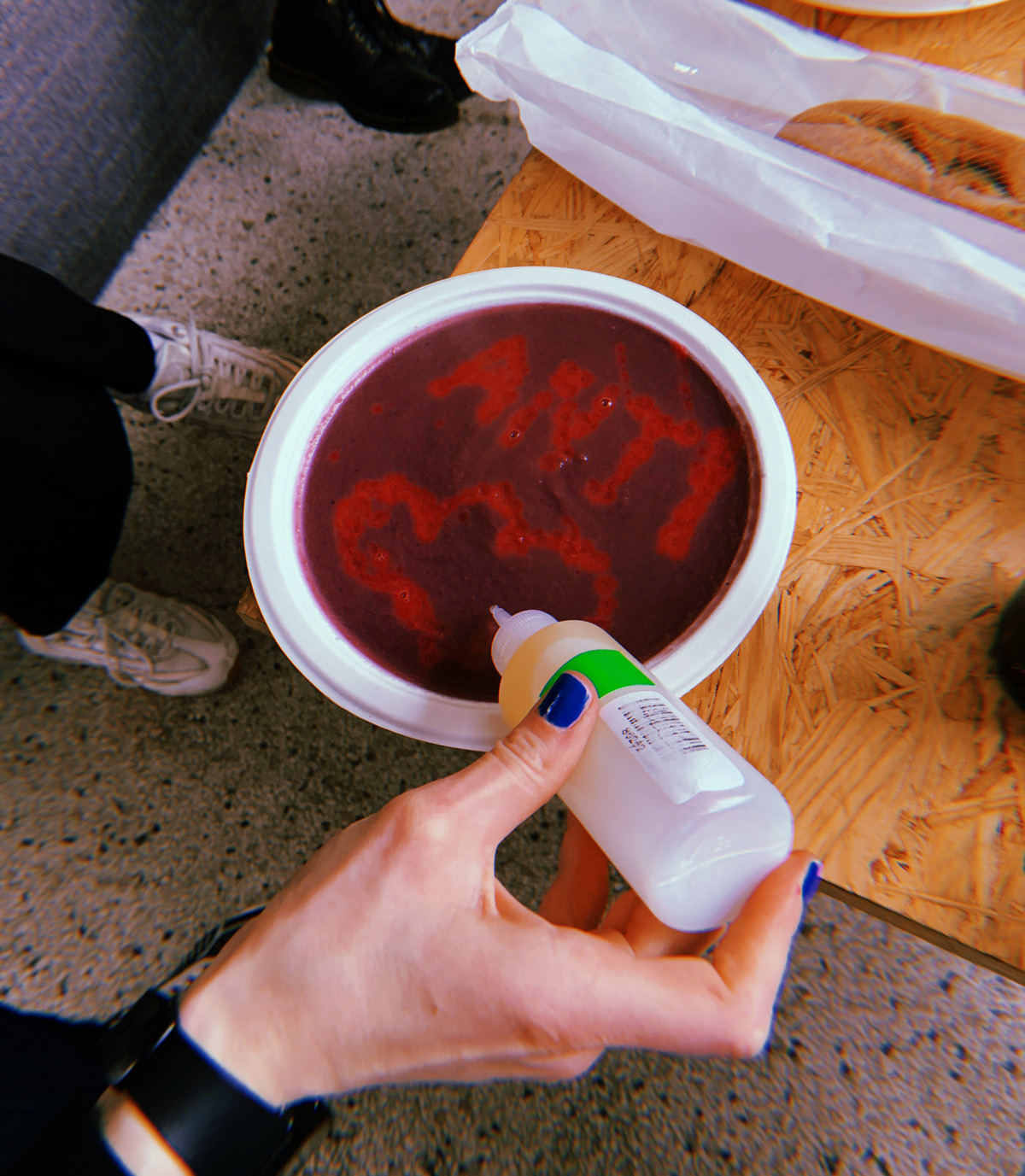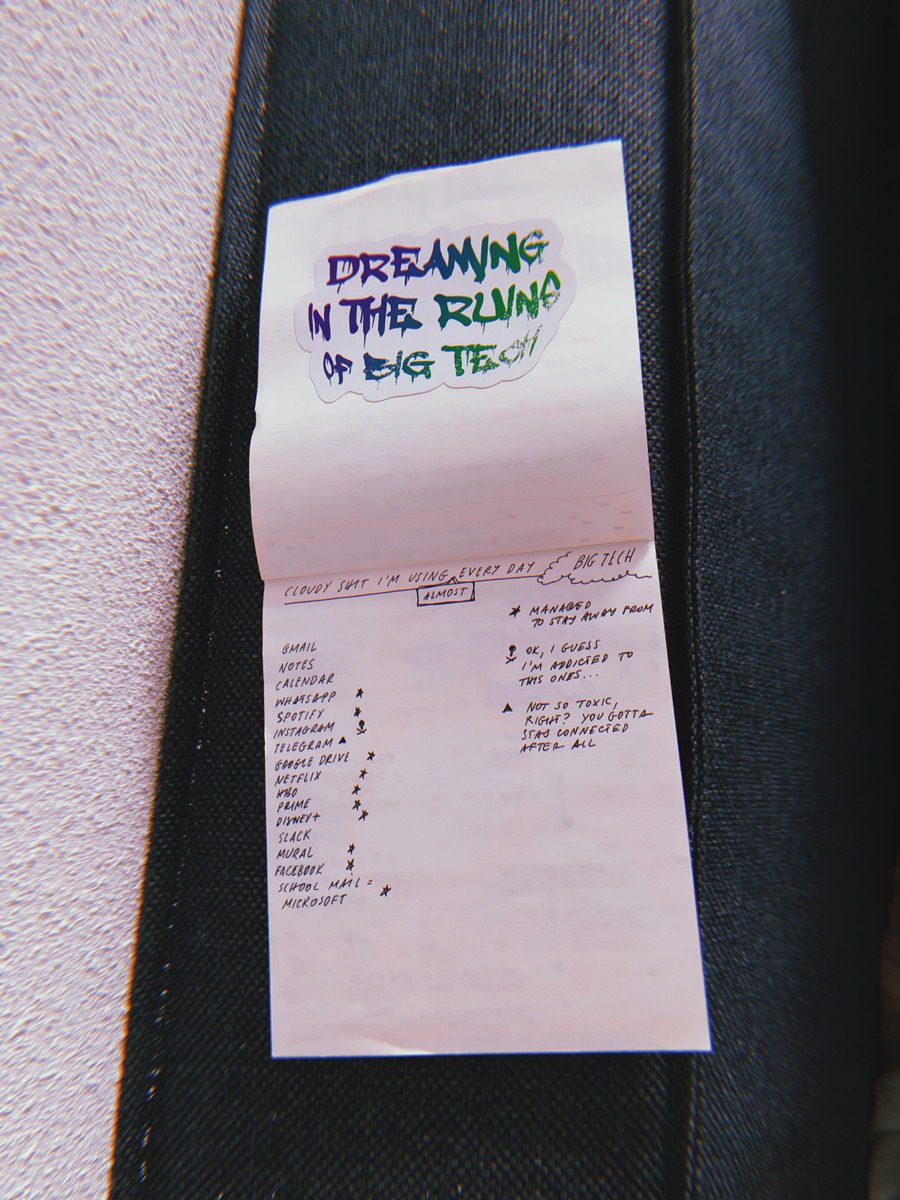International Trans★Feminist Digital Depletion Strike
_about
The International Trans★Feminist Digital Depletion Strike took place on March 8th, 2023 and it was convened by the following networks and collectives: Anarchaserver (Calafou), Bidston Observatory Artistic Research Centre (Liverpool), Ren Loren Britton (Berlin), Constant (Brussels), Critical Data Studies Program (Aarhus University), Dept. of Autonomous Design, KASK (Ghent), esc mkl (Graz), Hangar (Barcelona), In-grid (London), The Institute for Technology in The Public Interest (Basel, Brussels, London), NEoN (Dundee), time of tribes (Edinburgh), Varia (Rotterdam), A Video Store After the End of the World (Copenhagen), Systerserver, servus.at (Linz), Hackers and Designers (Amsterdam), la_bekka - espacio hackfeminista (Canary Island & Argentina), Red Autodefensa Feminista Online (Spain), DonesTech y Alia (Associació de Dones per la Recerca i Acció) (Spain), Minadoraserver (Tbilisi), Heart of Code (Berlin), APO-33 (Nantes), data.coop (Denmark), Institute of Diagram Studies, Pingping Press (Rotterdam).
Being in Rotterdam, I found about it by Varia and joined them for a day of sharing thoughts, conversations, food, drinks, and workshops. The invitation for the day was the following:
On 8th of March 2023, we call for a Counter Cloud Action Day. On this day, we will try to withhold from using, feeding, or caring for The Big Tech Cloud. The strike calls for a hyperscaledown of extractive digital services, and for an abundance of collective organising. We join the long historical tail of international feminist strikes, because we understand this fight to be about labour, care, anti-racism, queer life and trans★feminist techno-politics. Too many aspects of life depend on The Cloud. The expansionist, extractivist and financialized modes of Big Tech turn all lively and creative processes processes into profit. This deeply affects how we organise, and care for resources. Many public institutions such as hospitals, universities, archives and schools have moved to rented software-as-a-service for their core operations. The interests of Big Tech condition how we teach, make accessibility, learn, know, organise, work, love, sleep, communicate, administrate, care, and remember. Especially now our dependency on Big Tech Cloud seems intractable, it is time to reclaim space for renegotiating what might be possible. We want to imagine different infrastructures for collective life with and without computation. By calling for cloud resistance, we want to center slow trans★feminist, anti-racist and anti-imperial server practices. We want local digital storage, self-hosted videocalls, and collaborative server hosting. We want antifa-infras, low-energy graphics and queer circuits. We want accessible development, sustainable tech-maintainance, and feral supply chains. We want the end of work conditioned by Big Tech, and ultimately, the end of work. We want systemic, joyful, techno-political change. We mobilize from many places: self-managed projects, community centers, public institutions, cultural organisations, businesses and other constellations. On the 8th of March we will invent, propose, translate and mirror local modes of Counter Cloud Action. The plan is to party in the ruins of Big Tech whilst descending and dissenting from the cloud. On this day, we will experiment with minimizing our use of cloud-based applications, discuss the implications of the cloud regime, document the depletion of community resources by Big Tech infrastructure, remind our organisations to organise digital infrastructures in our interest, dream up alternative methods of otherwise exuberant joyful survival, and imagine local networks for transnational modes of communicating and operating in transversal solidarity.
▶ Visit their webpage for more detailed information.
_preparation
After I decided to join the strike and make this experiment, I asked myself how would I be able to handle a day without touching anything connected to the Big Tech Cloud. Therefore, I made a little preparation for this day, so I can really see which are the apps and platforms I am using on a daily basis that I should withhold from. So, here is what I did to get ready for the day:
_got a small and cute notebook ready to take notes during the day in a very analog paper environment; _made a list with the "cloudy shit i'm using [almost] every day" so i can be aware of what to avoid; _set an automated response on my gmail why i am away today; _added a status on the chats where people are often contacting me why i am away today; _basically, informed in advanced whoever might be looking for me on some of those places that i am not there on 8th of march.
There were also some useful tips published on the strike's mastodon.
_reflections
[what happened]
Ok, this is a report :D
_I woke up after a weird mild nightmare and opened instagram to distract myself. I immediately realised it's a no-insta day and closed it. _I decided to use telegram during that day, but all other chats' notifications were off. _I checked once a few things in case of emergency from a project I am currently working on - such as Slack. _Also opened my Notes app to take a screenshot of my to-do list, which I forgot to add to the prep. _Went to Varia where I enjoyed the rest of the day with the collective and it was easy to stay away from everything while being with all of them. :)
[some thoughts]
Here are some "free-writing" thoughts I had, while reflecting on the Counter Cloud Action Day:
_on chats
It's rather frustrating not to be able to be in touch with your friends like you're used to. Thinking of how much space do chats take from my day, even when I am really trying not to be there all the time, made me realise it is still a lot. I am also one of those people who get frustrated and anxious by phone calls. Not sure how and when it happened, but at some point, people calling me on the phone started making me super uncomfortable. I see part of that reason is the urgency to be available at that particular moment and the expectation (you imagine) of having to return the call asap as well. I somehow transported that anxiety to chats as well. Thus, I am now trying to fight the urgency of seeing the message immediately and responding as soon as possible. I now try to take my time and read/listen & respond in my own time. This is what I actually like about chats - being able to choose when to engage.
Anyways, I was also thinking about how can I optimise my usage of chats, so I can still be there but not have ignorant behaviour. For me, it means that whenever I am sending content over the chat, I should delete it (from its cloud) as soon as I don't need it there anymore. I went through my telegram, where I am most active, and deleted tons of photos, videos and files I was sending or receiving there.
_on social media
10 years ago I was on fire on social media. It was my job to be there and I loved it, it was still an exciting thing for me. 10 years later (now), I hate it, haha! Yes, I feel absolutely exhausted from it and cannot find any energy left to maintain an active presence on any of the popular networks. That also makes it quite hard for me to feel "relevant" and to share my work. But I am still a passive observer. I still have my instagram routine for scrolling there before falling asleep and I enjoy it.
A day without being online there would mean that if something important happens (like the strike, for instance), I cannot really share it. In order not to feed Big Tech with content and take care for their platform, I also need to stay invisible. Or if not completely invisible, quite disconnected. Doesn't also your online presence and feed represent your history, legacy and identification? For many, many people it does. Is there a way to be independent of this whole crazy mess and still be able to reach out to people?
_on the Big Tech Cloud
When you go through a day like that, you inevitably think of how can I actually make myself independent from the Big Tech Cloud. The realisation that is quite difficult if you do not have all the technical skills, nor the privilege of being able to afford to create your own infrastructure, can be discouraging. But actually, there are many things that can be done so we can still use it, just in a healthier way.
Many of the applications in the Big Cloud are created to increase productivity and make your (work) life easier. At some point, because of that, they become loved and used by people and the interest of the investors is increasing. What the system wants is for them to make more money, to have more users, and to make them spend more time online - in the cloud. This is where the trouble comes from, because this toxic stimulation of usage is what makes all the platforms unhealthy - for you and your time (from productive time, it becomes toxic time), for the environment (because it's true they live on exploitation of resources and cheap labour)... How can we (as individuals without any "real power" to change things on a big scale) fight that? How can we help ourselves to not feel completely powerless and hopeless?
It starts with being aware. Acknowledging the impact of the way we use whatever we are using. Starting small means that at least we can feed the cloud with less content - just as much as we need for as long as we need it. We can try to find alternatives where possible. To be conscious about how much we upload there and clean up after ourselves. Maybe it is a completely new thing to consider for many of us? We can now talk to others about all of this and find solutions together.

